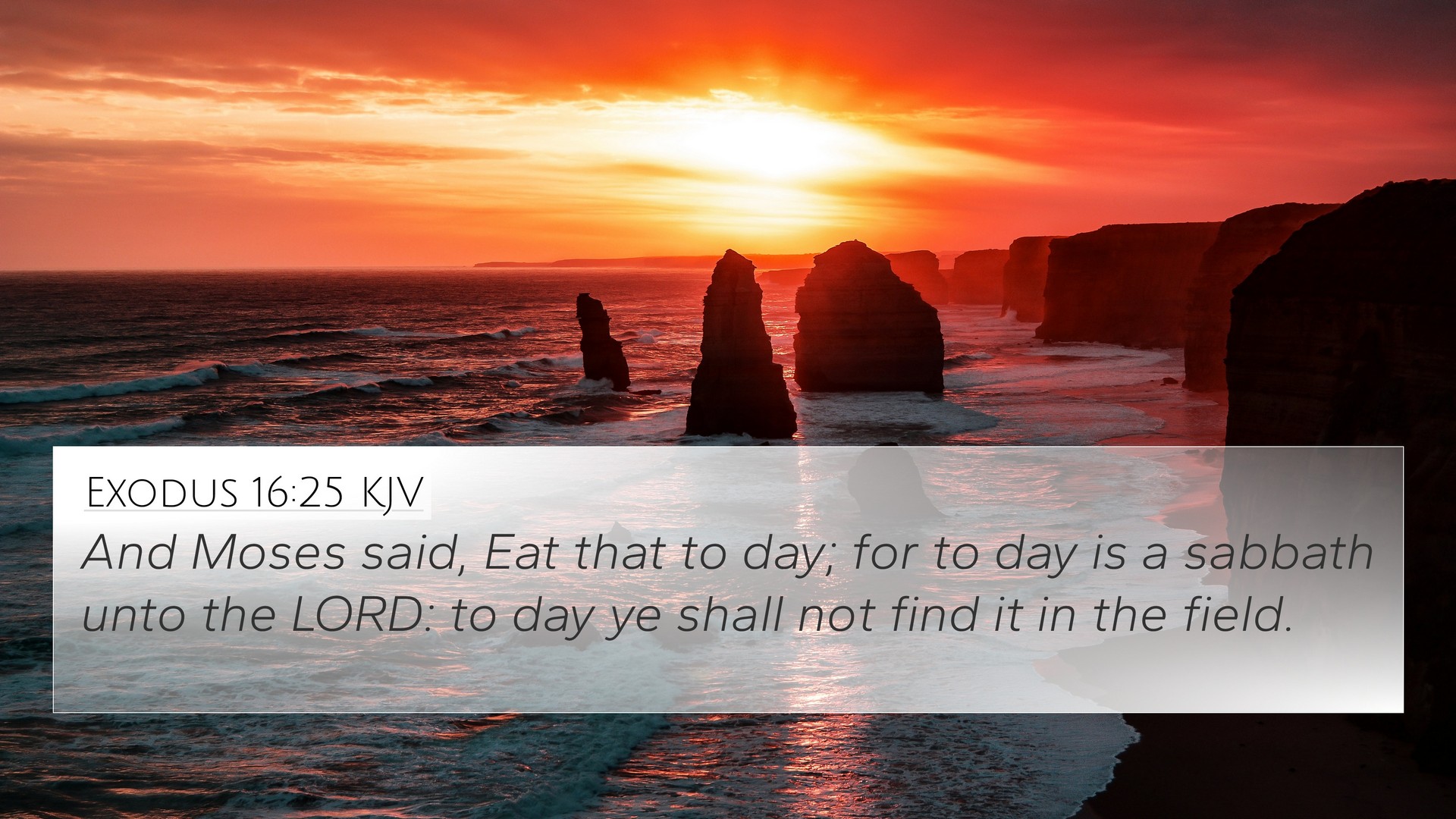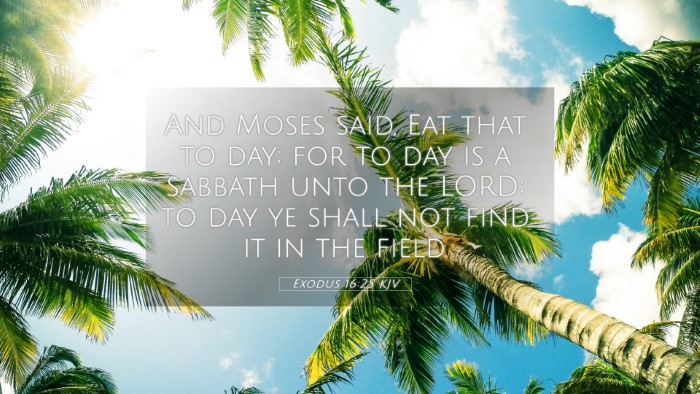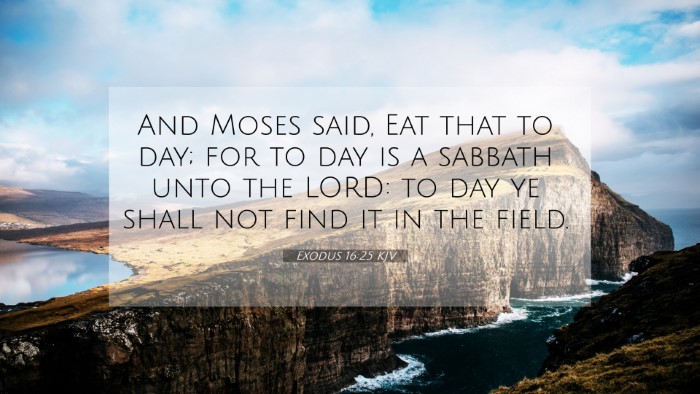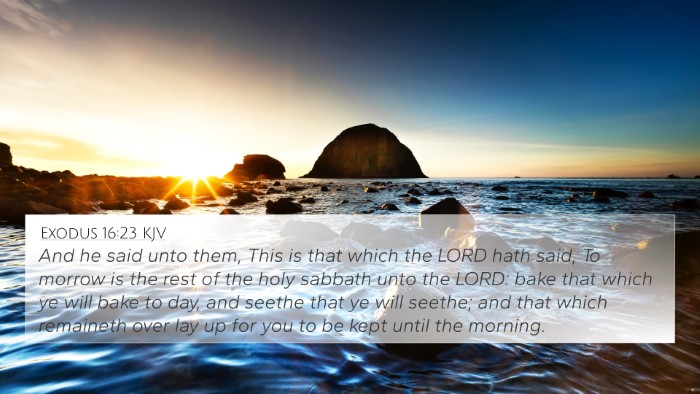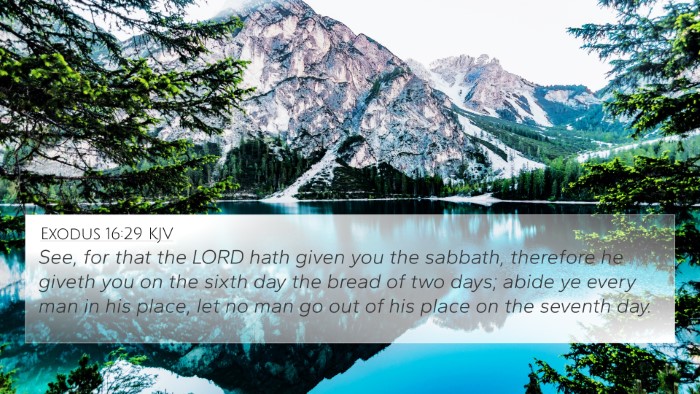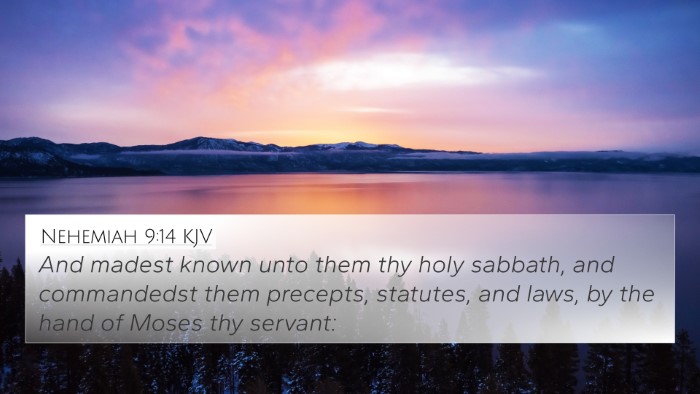Understanding Exodus 16:25
Exodus 16:25 states: “Moses said, ‘Eat it today, for today is a Sabbath to the Lord; today you will not find it in the field.’” This verse reflects on God's provision for the Israelites as they journey through the wilderness. Below is a summarized interpretation of this verse combined from several public domain commentaries.
Context of Exodus 16
In the broader narrative of Exodus 16, the Israelites are in the wilderness after their exodus from Egypt. They have been grumbling about their lack of food, and God replies by providing manna from heaven. This miraculous provision establishes important lessons about dependence on God.
Insights from Commentaries
- Matthew Henry: Henry emphasizes that this command about the Sabbath shows God's desire for His people to rest and honor the day set apart for Him. It teaches the importance of relying on God’s provision rather than their own efforts.
- Albert Barnes: Barnes highlights the significance of the Sabbath and the children's obedience to God's instructions about gathering manna only on six days. It serves both as a physical and spiritual rest, solidifying the covenant relationship with God.
- Adam Clarke: Clarke explains that the miracle of manna was not only to meet physical needs but also to shape worship and obedience among the Israelites. By not gathering on the Sabbath, they demonstrate faith in God’s promise.
Thematic Connections: Cross-Referencing Biblical Texts
Exodus 16:25 serves as a pivotal verse for understanding the connection between God’s provision and the principle of rest. Below are cross-references that enrich our understanding:
- Genesis 2:2-3: God rests on the seventh day after creation, establishing the precedent for Sabbath observance.
- Exodus 20:8-11: The Fourth Commandment explicitly calls for Sabbath remembrance, linking directly to Moses' instruction in Exodus 16.
- Deuteronomy 5:12-15: Reiterates the importance of keeping the Sabbath holy and reflects on God’s mighty acts of deliverance.
- John 6:31-35: Jesus references manna when explaining that He is the true bread from heaven, connecting the Old Testament provision to His spiritual sustenance.
- Matthew 12:1-8: Jesus confronts Pharisaical interpretations of the Sabbath, showing the heart of Sabbath observance goes beyond legalistic rules.
- Hebrews 4:9-11: The writer speaks about a Sabbath rest that remains for the people of God, promoting spiritual rest found in Christ.
- Mark 2:27: Jesus states that the Sabbath was made for man, emphasizing the purpose of rest for human well-being.
Exploring Connections Between Bible Verses
The connections between Exodus 16:25 and other scriptures illustrate the consistency of God's message throughout the Bible. Here are further thematic Bible verse connections:
- Scriptural Cross-Referencing: Each reference enhances understanding of the importance of observing Sabbath as part of God's covenant with His people.
- Bible verses that relate to each other: Observance of the Sabbath is about rest, trust, and reliance on God's timely provision.
- Inter-Biblical dialogue: The echoes of God's provision from manna to Christ show a continuous theme of sustenance that fulfills both physical and spiritual needs.
Comparative Bible Verse Analysis
As we delve into a comparative study of related verses, we observe key principles regarding God's faithfulness and the role of rest in the life of believers. Here are important insights:
- Faith in God’s Provision: The Israelites were to trust that God would provide for their needs, just as believers today rely on Christ for spiritual sustenance.
- Rest as a Divine Principle: The Sabbath serves as a reminder that spiritual and physical rest is crucial in a believer's life, grounded in God's original design.
- Loyalty to God’s Commands: Obeying God's word fosters a deeper relationship and reliance on Him, mirroring the dynamics of faith and obedience illustrated throughout scripture.
Conclusion
Exodus 16:25 encapsulates fundamental truths about God's provisions and the importance of resting in Him. As believers reflect on this verse, using tools for Bible cross-referencing can unveil deeper meanings and connections that enrich understanding of God's unwavering faithfulness.
For those seeking Bible cross-reference guides, resources like concordances and study tools can significantly aid in exploring how scriptures interlink, encouraging a profound engagement with the word of God.
